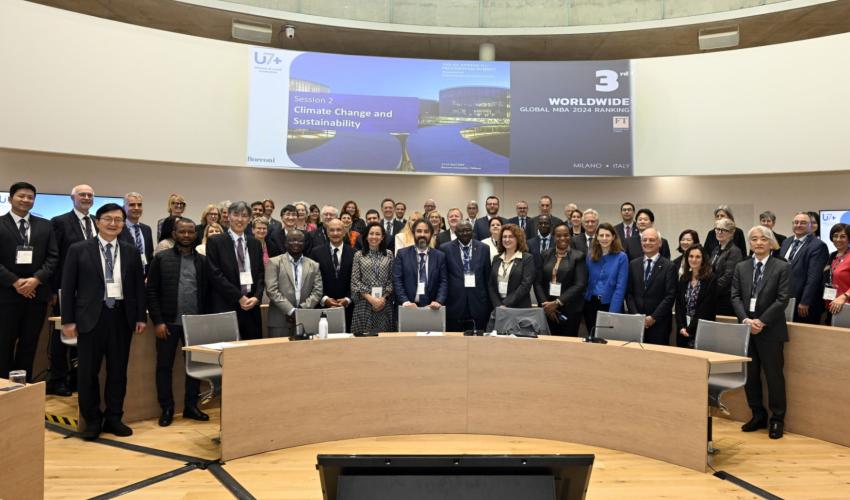
Universities Call on G7 Leaders to Work Together to Eliminate Barriers and Increase Access to Education globally
BOCCONI UNIVERSITY HOSTED THE PRESIDENTIAL SUMMIT OF THE U7+ ALLIANCE, WHICH DRAFTED A STATEMENT WITH PROPOSALS FOR CONCRETE ACTIONS TO PROMOTE INCLUSIVE EDUCATION TO BE PRESENTED TO THE G7 AHEAD OF THE JUNE SUMMIT IN ITALYIn a time of rapidly changing and increasingly unstable geopolitics, the members of the U7+ Alliance of World Universities are working together to address challenges related to access to education, in order to strengthen networks and continue to build global capacity to address some of society’s most pressing problems.
As the G7 prepares to convene in Apulia, Italy, more than 80 university leaders from 18 countries met at Bocconi University this week for the U7+ Presidential Summit and called on G7 leaders to work with them to support increased global access to higher education as a means of enhancing inclusion, building the next generation of leaders, and contributing to stable, flourishing societies.
“We believe supporting the continued development of a strong higher education sector that provides equitable access to quality education needs to be done in partnership with governments,” a statement from the U7+ Alliance reads. It states that this should be approached with the goals of “transforming individual lives, driving economic growth and global development, and ultimately providing opportunities for communities everywhere to achieve well-being and prosperity.”
“Universities play a crucial role in each of our communities and around the world to foster prosperity and development. We have a responsibility to reduce barriers to higher education, in partnership with other universities and through cooperation with multilateral organizations like the G7,” said Professor Meric Gertler, President of the University of Toronto and Chair of U7+ Alliance.
The presidents of 46 more U7+ universities formally committed to the 2024 U7+ Statement on Global Access to Higher Education which was delivered to Anna Maria Bernini, Italian Minister of University and Research, on April 11 as a representative of the Italian government who is playing host to the Group of Nations (G7) this year.
The U7+ Presidential Summit is the annual meeting of the U7+ Alliance, the first coalition of university presidents from Europe, Asia, North America, South America, Africa and Australia dedicated to defining concrete, collective actions universities can take to address global challenges, in coordination with government leaders in G7 countries and beyond. The inaugural meeting of the Alliance was hosted by Sciences Po in Paris in 2019, with the support of French President Emmanuel Macron. The University of Toronto currently chairs the Presidential Steering Committee, whose members also include Bocconi University, Georgetown University, Keio University, Université de Montréal, University of Ibadan, and University of Mannheim. Northwestern University serves as home to the Alliance Secretariat.
At this week’s Summit, themed Inclusive Education for Inclusive Societies, U7+ Alliance members recognized that equitable access to higher education poses a challenge within individual institutions, between them, and between regions of the world. They committed to work within their own institutions and across institutions to support access to higher education at all phases of the academic pipeline from admission to graduation, including fostering an inclusive and supportive culture on our campuses where all students, faculty, and staff can flourish.
“The world needs universities to solve immediate challenges, while also always working to benefit future generations,” said Francesco Billari, Rector of Bocconi University. “One concrete strategy we can take is to work with G7 nations to support the ease of student and scholar mobility by reducing visa burdens and ensuring that refugees fleeing persecution and violence can have a place to be part of the teaching, research, and community engagement universities provide.”
In the statement, U7+ university presidents requested commitment from and partnership with the G7 in four key areas, including a continued focus on developing high-quality and inclusive education systems from primary education through to higher education, supporting investment in higher education in low- and middle-income countries, providing funding to support students from marginalized communities locally and globally, and by supporting and prioritizing visas for students and scholars fleeing oppressive regimes, armed conflict or threats of conflict.
These requests for commitments from the G7 align with the foci of the 2024 G7 Presidency, where the Italian Government notes that, “the relationship with developing nations and emerging economies will be central. The engagement with Africa will be a key priority. We will work to build a cooperation model based on mutually beneficial partnerships, away from paternalistic or predatory logics.” This global scope is mirrored in the 2024 U7+ Statement on Access to Higher Education, which highlights collaborative initiatives that combine improved access to education for marginalized communities and for students and scholars at risk, with commitments to partner to strengthen local capacity for higher education globally. These include the University Corridors for Refugees – UNICORE 6.0 and the Africa Charter for Transformative Research Collaborations.
“Universities must work together at local and global levels to promote talent development while mitigating brain drain,” said Daya Reddy, Vice-Chancellor ad interim of the University of Cape Town. “By supporting initiatives such as the Africa Charter, members of the U7+ are embracing the frameworks we need for strengthening Africa-Global North partnerships in knowledge production, and in working towards more equitable university partnerships.”
Read the Statement
by Tomaso Eridani
